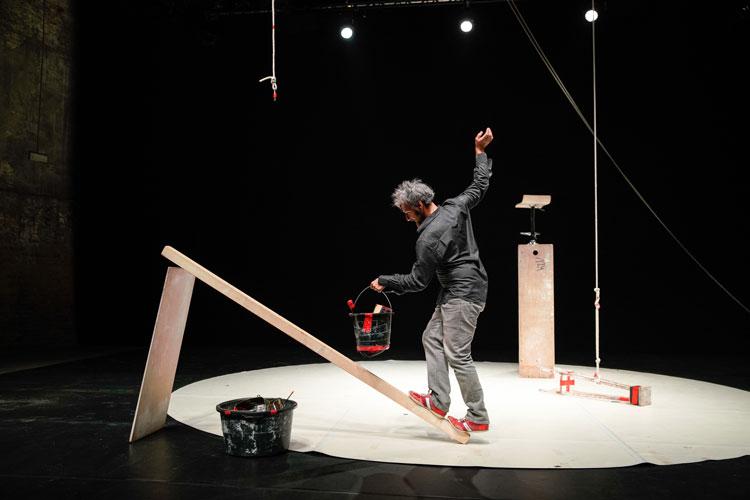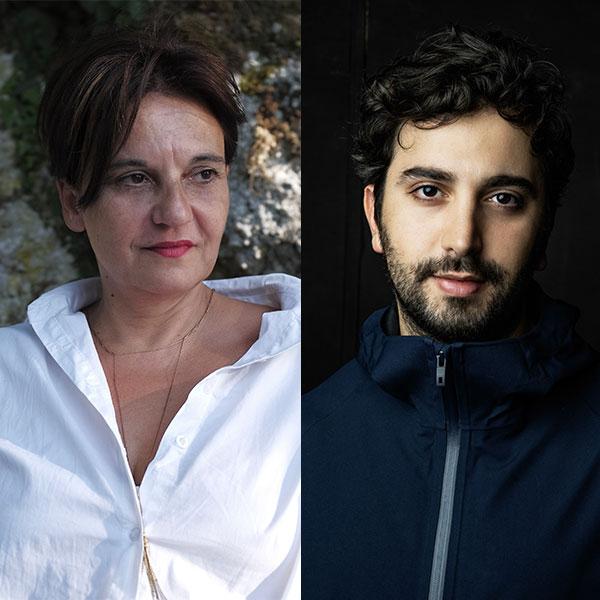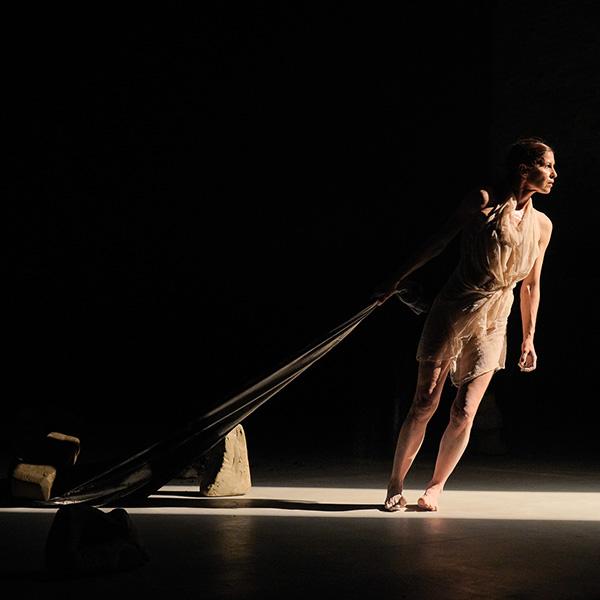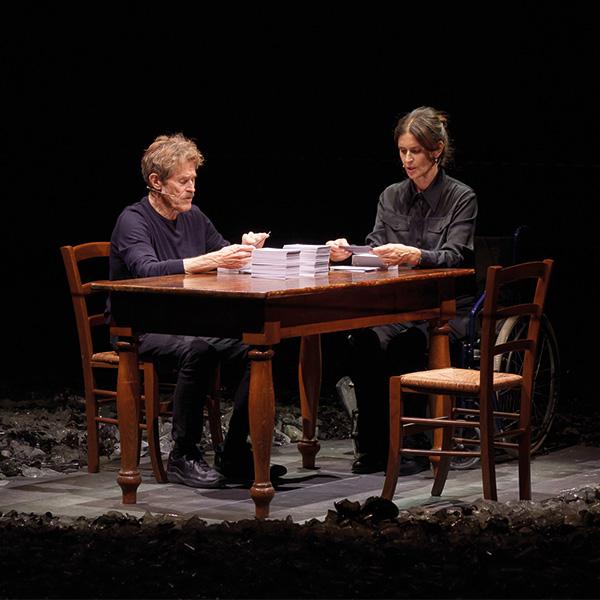Dance, Theatre, Music. From June through October La Biennale di Venezia, chaired by Paolo Baratta, becomes an international festival of live performance and a centre for training and research in the programmes of Marie Chouinard, Antonio Latella, and Ivan Fedele.

Biennale Teatro 2018: the actor / performer in the spotlight
The 46th International Theatre Festival, that Antonio Latella dedicates this year to the theme of the actor/performer, runs from 20 July to 5 August.
The 46th Festival
“Second Act” by Antonio Latella: the 46th International Theatre Festival, to run in Venice from July 20th to August 5th, is titled Actor / Performer. “Perhaps, as we find it increasingly difficult to understand why, for example, a production of theatre-dance cannot be defined as theatre, or vice-versa a production that we may define as ‘theatre’ also features performers at work, I believe that the object of the discussion may be circumscribed to two factors – vectors of the stage, the actor and the performer, and in particular where is, and is there still, a distinction between performer and actor”.
Choreography, direction, music, the plastic arts, juggling, puppet art, mime. The disciplines multiply and intersect in the shows presented at the Festival.
The authors include: Clement Layes, a French artist living in Berlin, born in 1978, studies in choreography, theatre, the circus arts, whose productions explore the humour in everyday life and its objects; Gisèle Vienne, a forty-year old French Austrian, studies in choreography and direction and a specialization in puppet art, who focuses on the interaction between the disturbing immobility of the artificial body and the dynamic nature of the natural body; Simone Aughterlony, forty years old, originally from New Zealand and now working between Berlin and Zürich in choreography and the performing arts, builds spaces that generate new forms of narration; Swiss artist Thomas Luz, born in 1982, a director and musician who experiments with a personal form of musical theatre; Davy Pieters, 30 years old, Dutch, a director who studied at the Theatre Academy in Maastricht, who uses video tubers' methods of composition, moving the actors as if they were inside a videotape; Vincent Thomasset, forty-four years old from Grenoble, author, director and choreographer, who works on language and its nuances; Jakop Ahlbom, born in Sweden in 1971, living in Amsterdam since 1990 where he studied mime at the Art school, presents distressing events within a theatrical narration – defined as physical visual theatre – akin to Hollywood genre-cinema.
From Italy, there will be: the Silver Lion award recipients Anagoor – which inaugurates the Festival with the world premiere of Orestea – Agamennone, Schiavi, Conversio -, more than a company an artistic collective, within which the performing arts, philosophy, literature and the hypermedia stage engage in dialogue; the duo Antonio Rezza – Flavia Mastrella, the former a performer-author, the latter an artist-author, winners of the Golden Lion for Lifetime Achievement, who will also open the festival with their highly original productions, “stage paintings” which are the result of a figurative language that mixes colours forms movement and words; Giuseppe Stellato, 38 years old, studies at the Fine Arts Academy in Naples, artist and set designer, who explores the fruition of images; Kronoteatro, the group founded by Maurizio Sguotti, which merges its directing work with the wood sculptures of Christian Zucconi, to primarily explore the conflict between generations.
The Festival will also feature the world premiere of Spettri, Ibsen’s classic (Ghosts) in the interpretation of Leonardo Lidi, winner of the first call dedicated to Italian directors under the age of 30 of the Biennale College – Theatre. As recommended by Director Latella, the call awarded a special mention to Fabio Condemi, who will be at the Festival with Jakob Von Gunten, inspired by the eponymous novel-diary by Robert Walser.
Crime story, thriller, mystery, horror and fantasy, slapstick. The plays often tell micro-stories inspired by slices of real life and question our perception of reality or simply tell it in a different way. How Did I Die by Pieters, for example, reconstructs a murder from various points of view involving the forensic police of Amsterdam; Dreamed Apparatus by Layes is an installation about the small everyday episodes that agitate our dreams to the notes of the soundtrack from Hitchcock’s Spellbound; Vienne's Jerk stages an imaginary reconstruction of the crimes of American serial killer Dean Corll using a ventriloquist and puppet theatre; When I Die – A ghost story with music by Luz is inspired by the intimate diaries of a woman found in an abandoned loft and turns that stream of words into a choreography; Stellato’s Oblò short-circuits the images of a dramatic death that lies before everyone's eyes with reassuring domestic elements such as a microphone and a washing machine. Without naturally forgetting the Oresteia created by Anagoor, the grand archetype of all detective and crime stories.
The artists have been invited to the Festival with more than one play to form mini-solo retrospectives as conceived by Antonio Latella last year. There will be 31 titles presented for a total of 48 performances; 20 are brand new, including 6 world premieres.
The central theme of Actor – Performer, which underpins the 46th Festival, is the focus of encounters with the participating artists and a symposium with Chris Dercon (Artistic Director of the Volksbühne in Berlin), Pawel Sztarbowski (Co-Director Teatr Powszechny in Warsaw), Bianca Van der Schoot (former Artistic Director of the RO Theater in Rotterdam and performer), Armando Punzo (director, founder of the Compagnia della Fortezza, former Artistic Director of Volterra Teatro).
Biennale College - Teatro
To give a voice and visibility to those who work in theatre in our country, taking into account the difficulty of breaking through and the generation gap: this is the premise of the Biennale College – Theatre.
This year, a new session of the project dedicated to directors under the age of 30 begins: at the end of the various phases of the selection process, the winning director will be awarded a production prize with which he will develop his play, created with the support of Director Antonio Latella, which will premiere as part of the Biennale Teatro 2019.
The call for directors will be integrated and completed this year by a call dedicated to authors, inviting playwrights under the age of 40 in Italy to work at writing a play that can narrate the present. The project dedicated to authors will develop over the three-year period 2018-2020 and will end, after various phases in the selection process, with the production of two original plays staged by the selected young directors. The first phase will begin with the dramaturgy workshop coordinated by Linda Dalisi and Letizia Russo – who will be the tutors throughout the three year period – and will take place during the 46th Festival. The call will be available online until March 15th (www.labiennale.org/en/biennale-college).
The Biennale College “summer school” also returns this year: in the course of the Festival, from June 23rd to July 4th, workshops in dramaturgy, direction, acting, photography, and the performing arts will be held by Roberto Latini, Silvia Calderoni, Gisèle Vienne, Guido Mencari, Jakop Ahlbom, Vincent Thommaset, Francesco Manetti and Alessio Maria Romano, Antonio Rezza and Flavia Mastrella.
“The theme proposed to the Masters of the Biennale College for this year is the kiss. The kiss as a gesture that has become part of our daily lives but is also a performing act that is renewed over and over again until it becomes unique and unrepeatable. We could start with the following question: have human beings always kissed? And has the kiss itself, or the gesture of kissing, maintained the same significance over the years or has its meaning changed over time?” (A. Latella). And simply Bacio will be the title of the final marathon that on August 5th will present the results of the Biennale College – Theatre to the public in a single space and an uninterrupted programme.
What’s new
A new feature of the 2018 Festival is the accreditation of “spectators in residence”, which will make it possible to enjoy the full range of events in the Festival of Dance Music and Theatre with the presence of tutor who will guide them in a dedicated experience through the performances and artists of the festivals, encounters with the protagonists and opportunities for dialogue and exchange. The accreditation to one or more of the Festivals may be purchased starting March 15th at the special price of 35 € for each event.
The call for “contributors in residence”, to be published within the next few days, is addressed to young Italian graduates ages 35 and under, and is structured as a process of research on the field with participation in the festival and studies in the Historic Archives of the Biennale. It will be tutored by professionals and supervised by the Directors of the Departments.
We would like to thank the Ministry for the Cultural Heritage and Activities for its significant contribution and the Regione del Veneto for its support to the programmes of the Dance Music and Theatre Departments of the Biennale di Venezia.


